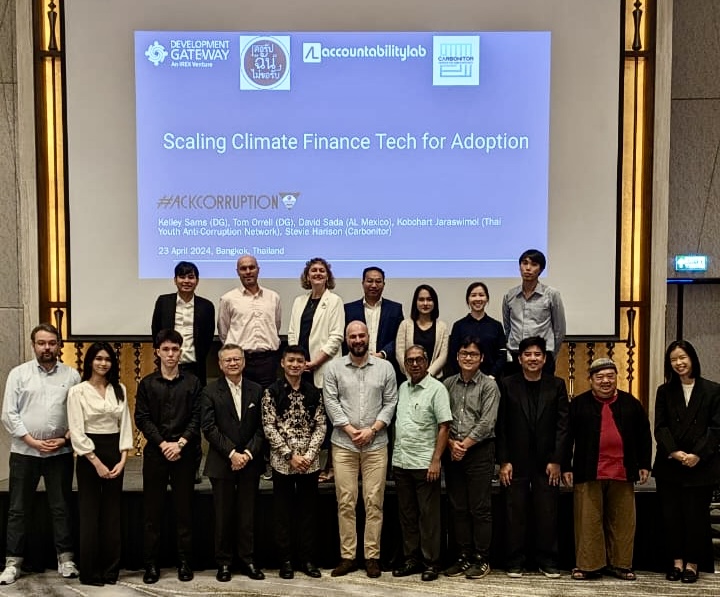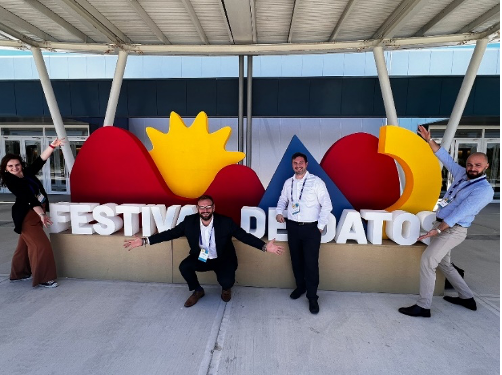Another Hub? Why the OpenGov Hub is Different
Co-working spaces, or “Hubs,” come in all shapes and sizes and typically have snazzy themes; incubator, accelerator, meet up, etc. They are also all the rage, popping up everywhere from the US to Africa, Asia, and Latin America. Although the ambitions and intent behind each hub are noble and good, these initiatives often struggle both operationally and financially.
Why is the OpenGov Hub different?
I am Stephen Davenport, Director of Innovation at Development Gateway and along with Global Integrity, we are the “institutional anchors” of the OpenGov Hub and we would like to think that this Hub is different, but is it true? We believe the answer is yes.
First, based on our experience the OpenGov Hub’s thematic focus on open government, rather than just being solely a place for techies to come together, is unique and will lead to more concrete collaboration. We don’t festishize technology even though many of the tenants work with or build technology. Tech can be powerful, but even more powerful are good strategy and good partnerships, something we aspire to catalyze at the OpenGov Hub.
Second, the OpenGov Hub is not an incubator. While we do have a few small start-ups in our community, the majority of tenants are established groups, many of them leaders in their respective fields. While time will ultimately tell, it’s arguable that the disruptive effects (in the positive sense) of collocating already established and successful organizations together is potentially more powerful than incubating the next great start-up. We are not, nor do we want to be, a Y Combinator for the open government community of practice.
Third, the OpenGov Hub is already financially self-sustaining. Every tenant pays their fair share, and there is no subsidy from a foundation or kind-hearted landlord to keep the space open. This might seem trivial but it’s not. Consider the recent fate of both GeekEasy and a recently shuttered civics hub anchored by the Points of Light Institute, both in Washington, DC. Both spaces closed their doors this year because the math simply didn’t work: the anchor institutions were subsidizing the rent for everyone else, which doesn’t wash in the long-run.
As we state on our new website, the:
OpenGov Hub aspires to be the day-to-day home to a range of people and organizations working on the open government agenda while also serving as a community gathering point for open government learning and networking activities in the Washington area.
One of the challenges going forward will be to nurture this collaborative ecosystem to make real things happen. We’d like it to be a place where the political, the technical, and the practical meet.
Others like Erik Hersman, founder of the iHub in Kenya, agree:
The real power of places like the OpenGov Hub is the serendipity that comes from it just existing as a place for like-minded people to meet, start initiatives or businesses and provide a focal point for the whole community.
The iHub itself has sure experienced this phenomenon – read their latest post, “Evolution of a Tech Space“, on their journey over the last two years. It is still early days for the OpenGov Hub, but the environment is already shaping up as we had hoped.
The co-mingling of colleagues from the Accountability Lab, Development Gateway, FrontlineSMS, Global Integrity, ReThink Media, and Ushahidi has already begun in earnest and the community building is moving quickly. Day to day collaboration, and coordination of similar activities like mapping and visualizations, are starting to highlight future joint work. Events like the “2012 Aid Transparency Index” in October, and the “OpenGov Hub Launch” in December, are just a few.
The hub is open to the public. To visit and setup a tour, please contact info@opengovhub.Org
More to come! Stay tuned…
–Stephen Davenport
Author: Stephen Davenport (@davenportsteve) is the Director of Innovation and Partnerships at the Development Gateway.
Share This Post
Related from our library

The Future of Technology Governance and Global Development: Why DG Brought DataReady In-house
DG is excited to announce we now have more robust data governance advisory services with the recent integration of DataReady.

Letting the Sunshine in: Building Inclusive, Accountable, and Equitable Climate Finance Ecosystems
In April, DG, HackCorruption, and the Thai Youth Anti-Corruption Network hosted a roundtable in Bangkok to discuss climate financing. This blog explores the main takeaway: a multi-disciplinary and multi-stakeholder approach that prioritizes local contexts, inclusive governance, transparency, accountability, and equitable distribution of resources is essential to impactful climate financing.

Developing Data Systems: Five Issues IREX and DG Explored at Festival de Datos
IREX and Development Gateway: An IREX Venture participated in Festival de Datos from November 7-9, 2023. In this blog, Philip Davidovich, Annie Kilroy, Josh Powell, and Tom Orrell explore five key issues discussed at Festival de Datos on advancing data systems and how IREX and DG are meeting these challenges.